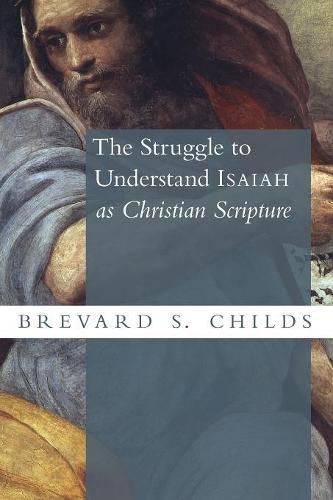Readings Newsletter
Become a Readings Member to make your shopping experience even easier.
Sign in or sign up for free!
You’re not far away from qualifying for FREE standard shipping within Australia
You’ve qualified for FREE standard shipping within Australia
The cart is loading…






This title is printed to order. This book may have been self-published. If so, we cannot guarantee the quality of the content. In the main most books will have gone through the editing process however some may not. We therefore suggest that you be aware of this before ordering this book. If in doubt check either the author or publisher’s details as we are unable to accept any returns unless they are faulty. Please contact us if you have any questions.
A key emphasis of Brevard Childs’s distinguished career has been to show not only that the canon of Scripture comprises both Old and New Testaments but also that the concept of canon
includes the way the Christian church continues to wrestle in every age with the meaning of its sacred texts. In this new volume Childs uses the book of Isaiah as a case study of the church’s endeavor throughout history to understand its Scriptures.
In each chapter Childs focuses on a different Christian age, using the work of key figures to illustrate the church’s changing views of Isaiah. After looking at the Septuagint translation, Childs examines commentaries and tractates from the patristic, Reformation, and modern periods. His review shows that despite an enormous diversity in time, culture, nationality, and audience, these works nevertheless display a family resemblance in their theological understandings of this central Old Testament text. Childs also reveals how the church struggled to adapt to changing social and historical conditions, often by correcting or refining traditional methodologies, while at the same time maintaining a theological stance measured by faithfulness to Jesus Christ. In an important final chapter Childs draws out some implications of his work for modern debates over the role of Scripture in the life of the church.
Of great value to scholars, ministers, and students, this book will also draw general readers into the exciting theological debate currently raging in the Christian church about the faithful interpretation of Scripture.
$9.00 standard shipping within Australia
FREE standard shipping within Australia for orders over $100.00
Express & International shipping calculated at checkout
This title is printed to order. This book may have been self-published. If so, we cannot guarantee the quality of the content. In the main most books will have gone through the editing process however some may not. We therefore suggest that you be aware of this before ordering this book. If in doubt check either the author or publisher’s details as we are unable to accept any returns unless they are faulty. Please contact us if you have any questions.
A key emphasis of Brevard Childs’s distinguished career has been to show not only that the canon of Scripture comprises both Old and New Testaments but also that the concept of canon
includes the way the Christian church continues to wrestle in every age with the meaning of its sacred texts. In this new volume Childs uses the book of Isaiah as a case study of the church’s endeavor throughout history to understand its Scriptures.
In each chapter Childs focuses on a different Christian age, using the work of key figures to illustrate the church’s changing views of Isaiah. After looking at the Septuagint translation, Childs examines commentaries and tractates from the patristic, Reformation, and modern periods. His review shows that despite an enormous diversity in time, culture, nationality, and audience, these works nevertheless display a family resemblance in their theological understandings of this central Old Testament text. Childs also reveals how the church struggled to adapt to changing social and historical conditions, often by correcting or refining traditional methodologies, while at the same time maintaining a theological stance measured by faithfulness to Jesus Christ. In an important final chapter Childs draws out some implications of his work for modern debates over the role of Scripture in the life of the church.
Of great value to scholars, ministers, and students, this book will also draw general readers into the exciting theological debate currently raging in the Christian church about the faithful interpretation of Scripture.